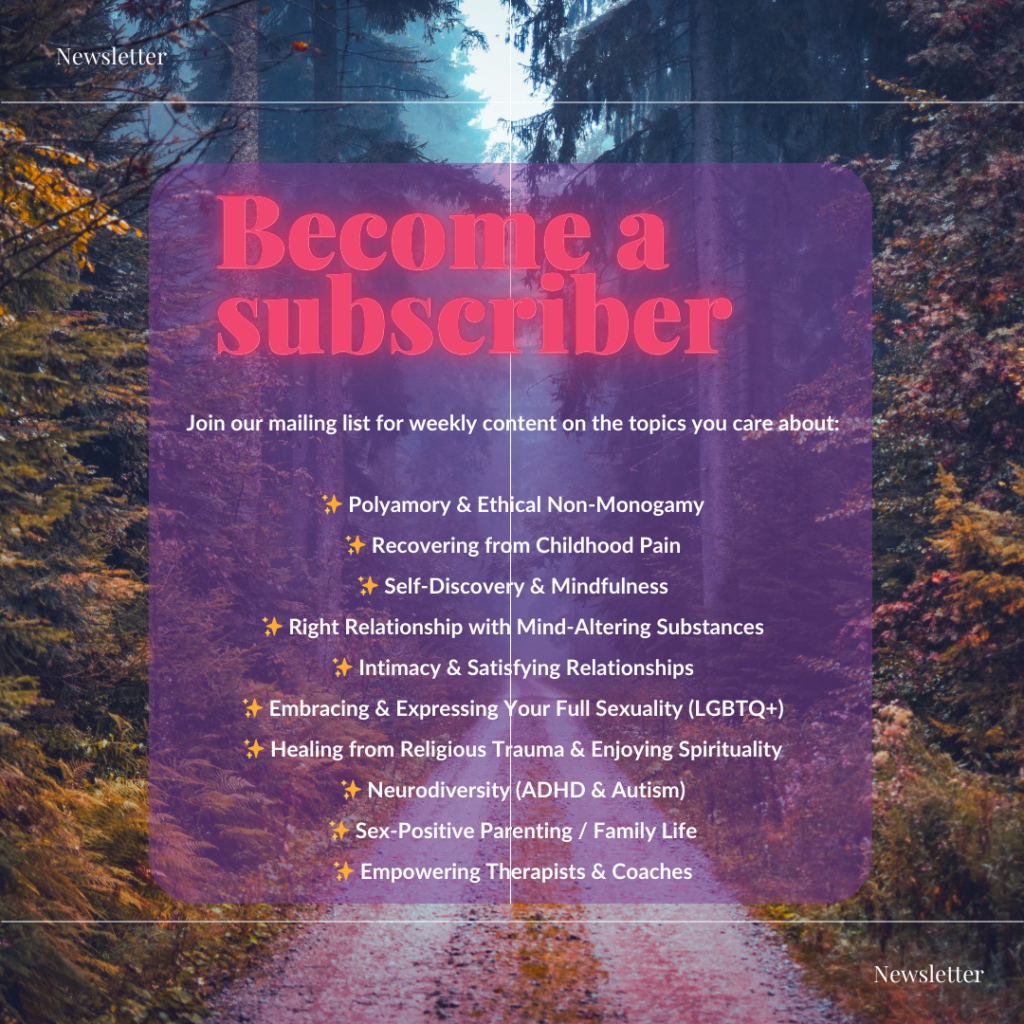
Navigating emotions within relationships can often feel like finding your way through a complex maze without guidance. As a therapist, trauma survivor, and polyamory advocate, I’ve come to understand the critical importance of not merely managing but fully embracing our emotional landscapes. Our emotions, with their vast and varied depths, present an unparalleled opportunity for growth, connection, and self-discovery.
For more insights and resources directly to your inbox, consider joining our email list.
The Myth of Emotional Smallness
A common myth I encounter in my practice is the notion that we should keep our emotions contained, as if they’re something to be ashamed of. This belief is not just restrictive; it’s harmful. It suggests there’s something inherently wrong with experiencing strong, intense feelings. The real challenge lies not within the emotions themselves but in our efforts to suppress or downplay them. Emotions are meant to be felt, processed, and expressed—they are fundamental to our being. Acknowledging this can set us free, enabling us to view our feelings with curiosity rather than apprehension.
Approaching Feelings with Curiosity
To replace fear with curiosity, we must first acknowledge our emotions as they are. This involves asking ourselves why we feel a certain way and what our emotions are trying to communicate. By doing so, we begin to see our emotional reactions as guides rather than adversaries, which can lead to deeper self-awareness and emotional intelligence.
To shift from fear to curiosity when encountering our emotions, we can adopt the following strategies:
- Acknowledge the Emotion: Recognize and name the emotion you’re feeling without judgment.
- Explore the Cause: Investigate what triggered the emotion. Is it a response to a current event, a reminder of a past experience, or anxiety about the future?
- Consider the Message: Ask yourself what this emotion is trying to tell you. Is there a need or desire that’s not being met?
- Reflect on Patterns: Notice if this emotion is part of a recurring pattern. Does it arise in specific situations or relationships?
- Seek Understanding, Not Control: Focus on understanding your emotions rather than controlling them. This can lead to greater emotional intelligence and resilience.
By engaging with our emotions from a place of curiosity, we can learn more about ourselves and how to navigate our emotional landscapes more effectively.
Curious about exploring these concepts further? Check out the Practices and Principles of Ethical Polyamory conference at ethicalpolyam.com.
Navigating Emotional Reactions
Suppressing emotions, especially in intimate relationships, often leads to disconnection from both ourselves and our partners. Conversely, acknowledging and validating our feelings paves the way for understanding and personal growth. It’s not about being led by every fleeting emotion but about recognizing our emotional reactions and reflecting on what they reveal about our needs, boundaries, and desires.

The Impact of Suppressing Emotional Responses
Suppressing our emotions can have numerous negative consequences, including increased stress, anxiety, and potential harm to our relationships. It can prevent us from addressing underlying issues and needs, leading to a buildup of unresolved feelings that may surface in harmful ways later on.
Suppressing our emotions can lead to a range of negative outcomes, including:
- Increased Stress and Anxiety: Bottling up emotions can increase feelings of stress and anxiety, as the underlying issues remain unaddressed.
- Physical Health Problems: Chronic suppression of emotions can manifest in physical symptoms, such as headaches, muscle tension, and sleep disturbances.
- Relationship Difficulties: Failure to express emotions can lead to misunderstandings, resentment, and disconnection from others.
- Emotional Numbness: Over time, consistently suppressing emotions can lead to a sense of disconnection from one’s own feelings, resulting in emotional numbness or apathy.
- Compromised Mental Health: Suppressed emotions can contribute to the development or worsening of mental health issues, such as depression and anxiety disorders.
Understanding the potential impacts of suppressing our emotions underscores the importance of finding healthy ways to acknowledge, process, and express our feelings.
Feeling overwhelmed? Reach out to one of Soaring Heart’s therapists or counselors for guidance and support.
Self-Soothing as Self-Empowerment
For those of us who have faced personal trauma, the value of self-soothing cannot be overstated. Techniques such as taking a moment to pause, retreating for personal space, enjoying a cup of tea, or immersing ourselves in nature are not mere distractions but vital strategies for emotional regulation. These practices help us find balance, allowing us to think more clearly and act from a place of response rather than reaction. They affirm our ability to confront challenges, fostering a sense of self-reliance and empowerment.
Ideas for Self-Soothing
- Breathing exercises: Deep, controlled breaths can calm the nervous system.
- Mindfulness meditation: Focusing on the present moment reduces anxiety.
- Engaging with nature: Time spent outdoors can enhance mood and reduce stress.
- Physical activity: Exercise releases endorphins, improving mental health.
- Creative expression: Art, writing, or music can be therapeutic outlets.
Creating Safe Spaces for Emotional Expression
In relationships, especially polyamorous ones, creating safe spaces for emotional expression is essential. These are environments where emotions can be freely shared without fear of judgment. It’s about building a setting where vulnerability is met with empathy, and everyone feels acknowledged and understood. While maintaining boundaries and personal accountability, it’s crucial to foster a dynamic that respects and honors the full range of human emotions.
Establishing Safe Spaces in Relationships
- Open communication: Encourage honest and respectful dialogue.
- Active listening: Show genuine interest and empathy towards others’ feelings.
- Non-judgmental acceptance: Accept emotions without criticism or dismissal.
- Mutual support: Offer and receive support without imposing solutions.

The Journey Towards Emotional Freedom
Embracing the full spectrum of our emotions leads us towards true freedom. It involves breaking free from societal and self-imposed restrictions that dictate how we should feel. Allowing ourselves to experience and express our emotions fully unlocks a level of authenticity and connection that is deeply transformative. This journey, though challenging, is immensely rewarding, resulting in relationships that are not only more satisfying but also stronger.
Our emotions, in all their complexity, are not barriers but gateways to deeper self-understanding, richer connections, and a more vibrant existence. Let’s approach our emotional landscapes with courage, openness, and a sense of adventure, embracing the entirety of our human experience.

Kathy Slaughter, MSW, combines deep expertise in individual and relationship therapy with a passion for personal growth. Educated at the University of Michigan with a focus on human sexuality, gender transitions, and trauma, Kathy excels in guiding people towards richer, more fulfilling relationships. With 15 years in therapy and social work, they’re an advocate for self-awareness and personal liberation. When not leading at Soaring Heart or engaging in community events like Burning Man, Kathy offers clinical supervision and enjoys speaking engagements. Their commitment to connection and empowerment shines through in every endeavor.

